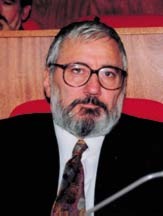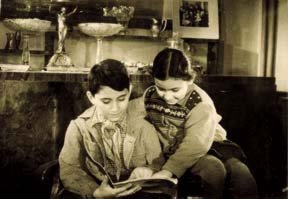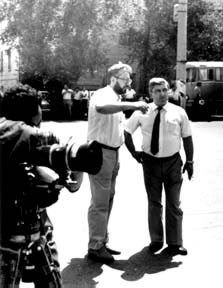|

Winter
1999 (7.4)
Pages
38-39
Famous People:
Then and Now
Ogtay
Mirgasimov
Film Director
(1943 - )
  Ogtay Mirgasimov (pronounced
og - TAI mir - gah - SI - mov) has been involved in Azerbaijan's
film industry for the past 40 years. He is currently the Executive
Secretary of the Filmmaker's Union and has held the position
of General Director of the State Film Company since 1992. He
holds the title of Honored Art Worker. Ogtay Mirgasimov (pronounced
og - TAI mir - gah - SI - mov) has been involved in Azerbaijan's
film industry for the past 40 years. He is currently the Executive
Secretary of the Filmmaker's Union and has held the position
of General Director of the State Film Company since 1992. He
holds the title of Honored Art Worker.
Photo: Ogtay Mirgasimov, late
1990s
A number
of his films have been awarded first prizes both in the Soviet
Union as well as Azerbaijan. Among them is the short documentary,
"Roads" (1965), a full - length documentary, "This
is the Mistake of the Truth" (1969) and a full - length
feature film "Devil in Front of My Eyes" (1987).
Mirgasimov has directed more than 40 documentary films, many
short - length as well as television films. His other feature
films include: "1001th Tour" (1976), "I Want to
Understand" (1980), "Silvery Van" (1982), and
"Jinn in the Microdistrict."
What experiences and interests in childhood would you say shaped
your life and career?
  As a kid, I loved watching
movies. Maybe that's why I decided to devote my life to cinema.
There was one Russian film that I liked in particular, directed
by Gregory Chukhray. It was about a young Russian soldier who
returns from the war and goes to see his mother. On the way home,
a number of things happen to him. When I was 15, it was my favorite
film. My father was the first President of the Academy of Sciences.
He was a surgeon. He died in 1958 when I was 14. At the age of
16, I started working as a worker in a chemical lab at Cinema
Studio. I wanted to get into the world of cinema, but I was too
young, so they offered me a job as a worker. As a kid, I loved watching
movies. Maybe that's why I decided to devote my life to cinema.
There was one Russian film that I liked in particular, directed
by Gregory Chukhray. It was about a young Russian soldier who
returns from the war and goes to see his mother. On the way home,
a number of things happen to him. When I was 15, it was my favorite
film. My father was the first President of the Academy of Sciences.
He was a surgeon. He died in 1958 when I was 14. At the age of
16, I started working as a worker in a chemical lab at Cinema
Studio. I wanted to get into the world of cinema, but I was too
young, so they offered me a job as a worker.
Photo: Mirgasimov
at about age 10 in the early 1958s.
After applying to the Moscow Cinematography Institute three times,
I was finally admitted in 1963. Getting into the school was so
competitive. I created several films while I was a student there.
I used to come to Baku to shoot them at the Baku Cinema Studio
and then took them back to the Institute in Moscow. I received
several awards for my student footage. My films included "The
Sea", "Gobustan" and "This is the Voice of
Nature".
  I received my first
award in 1965 at the All - Union Student Festival of Films held
in Moscow. I received first place for "Yollar" (Ways),
a four - minute film that showed the passages of life. I was
so proud that someone from Azerbaijan had won first prize in
such a stiff competition. What was interesting is that I had
entered my film in the Festival and then returned to Baku to
shoot another film. So I was very surprised when our cameraman
called from Moscow to say that I had won first prize! I considered
it a victory for our entire nation, not just for me. I thought:
"Great, an Azerbaijani has won the prize!" I never
thought of that prize as just being mine. I received my first
award in 1965 at the All - Union Student Festival of Films held
in Moscow. I received first place for "Yollar" (Ways),
a four - minute film that showed the passages of life. I was
so proud that someone from Azerbaijan had won first prize in
such a stiff competition. What was interesting is that I had
entered my film in the Festival and then returned to Baku to
shoot another film. So I was very surprised when our cameraman
called from Moscow to say that I had won first prize! I considered
it a victory for our entire nation, not just for me. I thought:
"Great, an Azerbaijani has won the prize!" I never
thought of that prize as just being mine.
Photo: Mirgasimov on location,
filming "Devil in Front of my Eyes" (1987).
That recognition changed my life completely. I was the youngest
of five children and I had such an inferiority complex. There
were always very talented young students at our Institute and
I considered them to be much more clever than me. Whenever I
tried to make a name for myself, it seemed impossible. My victory
at the Festival gave me much more confidence.
How was your own childhood different from that of kids growing
up today?
There's so much that is different, of course. Our parents and
grandparents used to say: "In our day children were better,
they were more obedient," and things like that. I didn't
always take their words seriously. But now I see that much of
what they used to say is still deeply embedded in my consciousness.
I consider myself a man of the 19th century, not the 20th. Why?
My father was born in 1883. His lifestyle, philosophy, ethics
and rules all dated back to the 19th century. He left some traces,
of course, and I absorbed some of his way of thinking. I see
that the rules that I'm used to do not coincide with modern ones.
I still prefer the old ways.
I don't worry about our future, because I'm content with the
past. Our past is so beautiful and strong from all points of
view.
Technical progress is an objective reality. But at the same time,
it can result in negative things as well. For example, it can
negatively influence the environment. Computers are good, but
the more people use them, the more their brains become passive.
We are living in difficult days now. The only thing that always
helps is optimism. Even those who were destined to spend many
years in exile in Siberia came back and even wrote books. How
did they do it? Optimism drove them.
What advice would you give to young people as they enter the
21st century?
We shouldn't say my interests, my land, my family, my happiness,
but rather our interests, our land, our happiness, our economy,
our atmosphere, our air. In physics there is a Law of Connectivity.
This law should be applied to society as well. We are all interconnected.
Youth should understand this.
We must know that if today we close libraries and open restaurants
instead, then tomorrow our children will be a lost generation.
The young must read a lot in order to know how to protect the
land and the nation. The young must know that everything is connected
in life. If sports do not develop, then we won't have a strong
army.
One more thing - we must protect education. The young must read
more and more. I say it to you openly - today's young are not
aware of anything. Some of them don't even know how the Earth
is shaped: round, square or flat. It's so bad.
What would you say is your greatest achievement in life? What
do you want to be remembered for most?
The work that I consider my best is a 10 - minute film called
"Night Talk". Of course, this doesn't mean that I don't
like my other works. No, they are all close to my heart. Very
soon I'll start working on another film called "Recovery
Book", which depicts events at the beginning of the century.
I think the films that have yet to be shot always seem to be
much more interesting, since they represent a dream and a wish.
Man always has this innate wish to create better and more beautiful
things.
Ogtay Mirgasimov
was interviewed by Farida Sadikhova.
From Azerbaijan
International
(7.4) Winter 1999.
© Azerbaijan International 1999. All rights reserved.
Back to Index AI 7.4 (Winter
1999)
AI Home |
Magazine
Choice
| Topics
| Store
| Contact
us
|